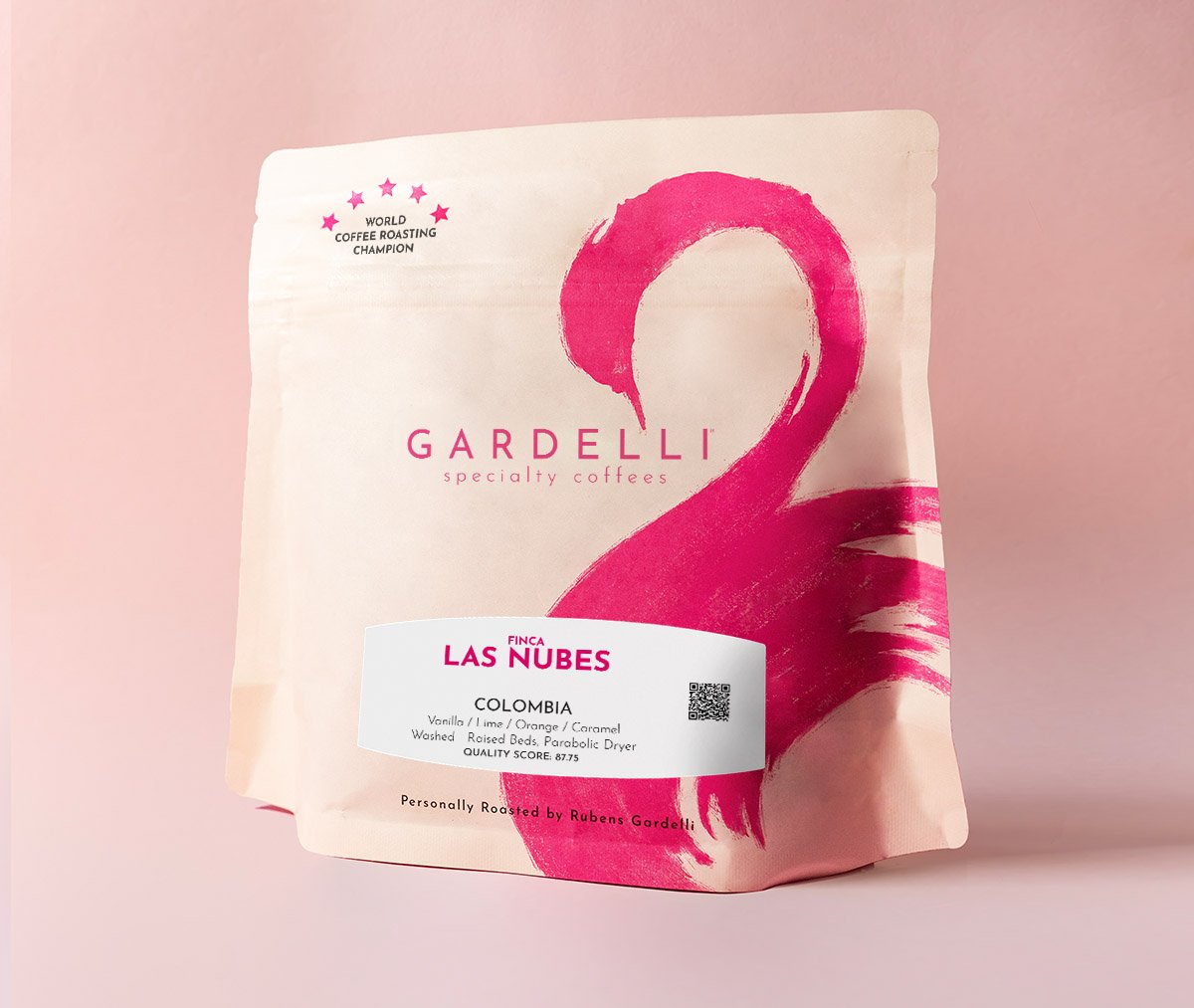




Colombia
QUALITY SCORE: 87.75
Cup Notes
Vanilla / Lime / Orange / Caramel
Suggested for espresso and filter
when we roast
We freshly roast to order all coffees on Monday, Wednesday and Friday (excluding national holidays), and ship the same day! Cut-off time is 11:59pm (UTC+1) of the day before the roast day. *We only ship whole beans*
Finca Las Nubes, located in the township of Agua Negra just 15 minutes outside of Pitalito, Huila, Colombia, is a partnership between professionals from every part of the coffee supply chain. By bringing together this varied experience from each step in the process the team plans to focus on quality and sustainability throughout production.
The farm was purchased in early 2020 and had been already planted with coffee, but needed some attention and care to get the coffee trees into good shape. While part of the focus initially was to get the trees prepared to produce quality coffee, the farmers already had plans to plant less common varieties in Colombia—varieties like Mokka, and Sudan Rume. As of right now, the 27-hectare farm is planted with Castillo, Colombia, Caturra, Pacamara, Pink Bourbon, and Gesha. Sitting at the top of a mountain overlooking the Laboyos Valley, Las Nubes gets mild temperatures around 18–21° C during the day, with cooler temperatures around 10–12° C during night, and enjoys an unobstructed view over the valley and surrounding mountains.
The main building on the farm is equipped with a drying space under the roof, as well as a water collection system that stores rainwater in a subterranean tank for daily tasks and coffee processing. Las Nubes also has an automated cherry floating system, depulper, and a 10,000 kg capacity mechanical silo on site for processing.

CASTILLO
Castillo is named after the researcher Jamie Castillo, who helped Cenicafe, Colombia’s coffee research centre, develop the varietal in 2005.
Castillo was designed as an improvement on the Colombia variety. It is resistant to leaf rust (roya) and has quickly become the most planted coffee in Colombia. It is high-yield, resistant to leaf rust and other prevalent diseases and its smaller size allows for greater planting density.
COLOMBIA
Using Catimor’s HdT x Caturra recipe as a blueprint, Cenicafé first created the Colombia variety as an F5 composite, and released it in 1982.

Washed coffees showcase solely the bean. They let you taste you what’s on the inside, not the outside. Washed coffees depend almost 100% on the bean having absorbed enough natural sugars and nutrients during its growing cycle. This means the varietal, soil, weather, ripeness, fermentation, washing, and drying are absolutely key.
Washed coffees reflect both the science of growing the perfect coffee bean and the fact that farmers are an integral part of crafting the taste of a coffee bean. When looking at washed coffees, it becomes apparent that the country of origin and environmental conditions play a vital role in adding to the flavour.
During wet processing, the pulp (i.e.the exocarp and a part of the mesocarp) is removed mechanically. The remaining mesocarp, called mucilage, sticks to the parchment and is also removed before drying. During this process, the sugars present in the mucilage are removed through natural fermentation or mechanical scrubbing. Mucilage is insoluble in water and clings to parchment too strongly to be removed by simple washing. Mucilage can be removed by fermentation followed by washing or by strong friction in machines called mucilage removers. Fermentation can be done by stacking the coffee outside or placing it under water and allowing nature to take its course. After the sugars are removed, the beans then can be taken through a secondary washing to remove any additional debris, or taken immediately to the beds for drying.
This coffee lot was selected for washed processing. Cherries destined to become washed coffee are harvested when they reach 20–22 degrees Brix, which is unit for measuring of sugar content in cherries. The coffee is then floated to remove any bad cherries before being depulped. The pulped coffee is fermented for 40 hours and then fully washed. Finally, the coffee is moved to the drying area onto parabolic raised beds where it dries for 18–20 days until it reaches the target percent of humidity.
